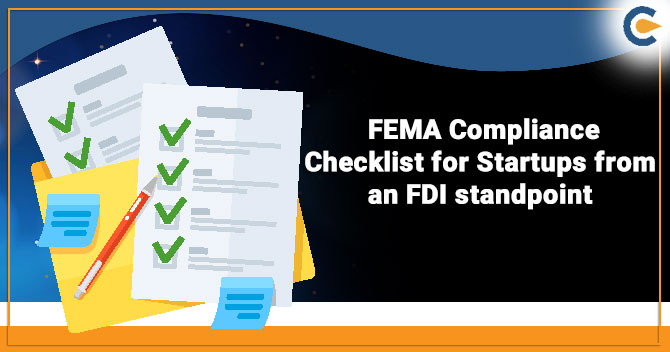The Foreign Exchange Management Act (aka FEMA) administers the flow of overseas funds coming to India and vice versa. The Act came into effect in 1999, and apart from regulating the funds, it also laid down the FEMA compliances for corporate bodies. Foreign Direct Investment is one of the key sources of funding for the Indian business fraternity. Under foreign direct investment, i.e. FDI, funding from overseas firms and individuals is invested in Indian-based establishments and startups. A foreign investment amounting to more than 10% is deemed as FDI. The FDI policy is administered under the Foreign Exchange Management Act, 2000 under RBI. In this write-up, you will learn about the FEMA compliance checklist for startups from an FDI viewpoint.
In India, the funding under FDI is possible under two routes as mentioned below:
Automatic route
Under this route, the non-resident investor does have to avail prior permission from GOI or the Reserve Bank of India[1].
Government route
Under such a route, permission from concerned Ministries or Government-driven authorities is needed via the Foreign Investment Facilitation Portal (FIFB). FIFB is managed by the DIPP, aka Dept of Industrial Policy & Promotion.
Read our article:A Complete Overview on NBFC Compliance under FEMA
Sectors where foreign direct investment is permissible under 100%- automatic route


Sectors embracing up to 100% overseas funding under the Government route
- Banking & Public Sector – 20%
- Food Products Retail Trading – 100%
- Core investment company – 100%
- Multi Brand Retail Trading – 15%
Sectors that avert FDI under Government and automatic routes
- Lottery business, including private lottery, online lottery, etc.
- Chit funds
- Nidhi company
- Construction companies
- Real estate business
- Atomic energy
- Casinos (gambling and betting)
Navigate to the official portal of DIPP to get the complete list of sectors
The following section shows the FEMA compliance checklist that established firms and startups require complying with before going in for FDI.
FEMA compliance Checklist relating to FDI under Automatic Route
- Examine the individual’s eligibility seeking to make funding via FDI.
- Check whether the total overseas investment/FDI is with the sectoral threshold and not under forbidden sectors.
- Ensure that any bonus/rights issue has not resulted in foreign direct investment surpassing the sectoral threshold.
- Determine whether the firm has complied with the issuance of shares if any corresponding to pre-operative/pre-incorporation expenses
- Determine whether the directions are fulfilled while computing overall overseas investment.
- Determine if yearly returns on overseas liabilities as well as assets are filed every year on or before 15th July. The return has to be filed even in the absence of fresh funding in the particular year.
FEMA compliance Checklist relating to FDI under Government Approval route
- Determine whether there is any share transaction of any sort from resident to a non-resident which seeks Government authentication.
- Determine whether prior consent of the FIBB is availed for FDI which is surpassing the sectoral threshold.
- FEMA compliance Checklist relating to the establishment of a branch /project office/ liaison in India
- Determine if the firm is carrying any task which would be considered to be a having a business place in India as Companies Act, 2013 & if the compliance under CA, 2013 & FEMA has duly complied.
For Direct investment taking place outside India under Automatic route
- In cases of Investment via swapping of shares, make sure that prior consent of the Government was availed. It is a mandate for making Investment via swapping of shares
- Determine in cases where Alternative Investment Funds (AIFs)/ Domestic Venture Capital Funds, registered with SEBI, has invested in equity & equity-based instruments of off-shore venture capital undertakings, the investment is maxed out at USD 500 million.
- Determine whether the obligations like Annual Performance Report, reporting of remittances of the Indian party have been duly met.
Some Other Pivotal Features of FEMA Compliance
FEMA shall not apply to Indian nationals residing in overseas nations. There is a standardized technique of determining an Indian citizen’s residence. Under such a technique, the number of days spent by an individual in India is calculated against the underlying norm of 182 days or more. Whilst using such a technique, an office, a branch, or an agency can be deemed as a person.
FEMA confers the federal government the right to impose restrictions on 3 items while also administering them. These include payment obtained from India, payment made to people residing outside India, and foreign security arrangements.
Conclusion
This Act increases the transparency of cross-border trade and improves foreign investment. The significance of FEMA filing is imperative from the global trading viewpoint and ever-evolving trading practices. Every startup must refer to the FEMA Compliances checklist mentioned above before exposing to foreign funding. Since the penalties under FEMA are quite stringent, make sure to keep tabs on different fundamental thresholds relating to sectoral and investment.
Let us know if you seek any clarification on FEMA Compliances checklist. We would strive to resolve them on priority and with utmost care.
Read our article:Learn Everything about FDI Compliances under FEMA











